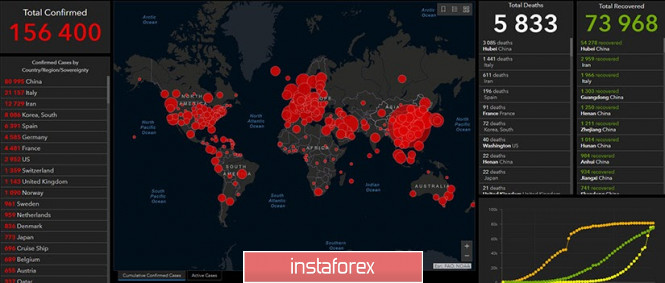
Unfortunately, the key topic for the whole world is the pneumonia virus called COVID-2019. All currency pairs and instruments continue to trade in full alert mode. All macroeconomic factors continue to be ignored by market participants, and experts in the medical field believe that the coronavirus is likely to continue to spread across the planet. Unfortunately, humanity faces various diseases from time to time, but if the previous disease was localized and defeated relatively quickly (SARS virus), this does not mean that the current disease will also be quickly defeated. A lot of films have been made on this topic, some of them surprisingly accurately reflect the spread of infection (for example, the 2011 film "Contagion", which was noted by all scientists as a reliable reflection of scientific facts). In the current conditions, this film can be recommended for viewing by everyone.
Once again, it should be said that, in principle, predicting the spread of any infection is divination on coffee grounds. It is impossible to accurately predict the extent of the virus, when it is not even known for sure how long it can live outside of a living organism and what all the ways of its transmission are. Usually, when predicting a similar case of the disease, parallels are drawn between the rate of spread, mortality, number of people who have recovered, and so on... In fact, now that there is no vaccine against the virus, the main task of all countries of the world is to localize the disease, that is, stop its spread. But for this, as it turned out, you need to enter a quarantine, isolate all sick or infected people. It is obvious that such measures will have a very bad impact on the economy. For example, in Italy, a country where tourism is extremely developed and is one of the main sources of income, the quarantine will have devastating consequences. In addition, in any case, industrial production is reduced, companies are closed for quarantine, business activity falls accordingly, and so on. And in each country, the same will be observed, taking into account the local specifics.
A big problem, in addition to the relative ease of distribution, is also the huge number of questions that scientists do not yet have answers to:
1) What will be the extent of the disease in non-developed countries? Will efforts to control and contain the virus in developed countries be in vain if less developed countries remain infected?
2) China managed to contain the pandemic, will it be possible to do this in other countries?
3) Is the disease seasonal? In other words, is the virus susceptible to heat or cold, and is it equally dangerous in summer, spring, and winter?
4) What is the percentage of fatalities in developed and undeveloped countries?
5) what is the probability of new waves of infection in countries that seem to have already managed to stop the spread of the virus?
As we have already found out in the previous article, in any case, the consequences for the economy will be negative. In any case, individual sectors of the economy will suffer very much. For example, airlines. Given the fact that many countries, especially such large ones as the United States, have closed partially or completely air traffic, it is natural that airlines will incur losses. At least, during the second quarter of 2020. If the epidemic can be contained quickly, recovery may begin in the third quarter. What if we can't localize it quickly? Some companies may suffer losses so large that they will be forced to declare bankruptcy. The longer air transport and any international transport in general will remain quarantined, the longer the quarantine will be in effect in countries, the more the demand for oil will decrease and, consequently, the price of all types of fuel will be extremely low. In turn, this will hit commodity countries and their currencies, and cause a certain crisis and economic slowdown. The worst thing for us, traders, is that the situation in the currency market is unlikely to stabilize in the near future. Market participants, major players, and investors either panic or urgently transfer their funds to the safest assets, which, of course, negatively affects risky assets and currencies. When the EUR/USD pair regularly passes 100-150 points per day, this makes it completely unattractive to trade for most traders who are used to volatility of 40-60 points. Thus, our personal forecasts are as follows: the currency market crisis will continue for at least some time, perhaps two or three weeks; until we find ways to completely block the spread of infection or find an effective vaccine against it, we should not wait for the global economy to recover. In the near future, the macroeconomic indicators of all countries of the world may begin to fall synchronously, despite the actions of central banks to stimulate.
The material has been provided by InstaForex Company - www.instaforex.com